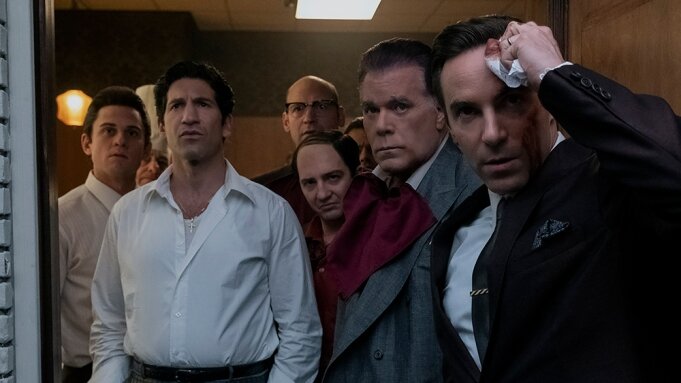'The Many Saints of Newark' has too many things going on at once
Every time The Many Saints of Newark is brought up in a conversation, someone is confused if it's a movie or tv show. Indeed it is a movie even if it doesn't want to be one. The deliberately slow pace of the televised drama The Sopranos is replaced with a blender full of disjointed events. The Sopranos is known for having too many characters. In television, the writer can take his time, allowing the audience to know each person. Narrative filmmaking is a whole different ball game where everything must be condensed to benefit the final film. Character development is present here, but each scene comes to the audience at the rate of a tommy gun.
Thank God I watched the entire series before seeing this, or I'd have no idea who's who other than Corrado (Corey Stoll) and Tony Soprano (Michael Gandolfini) Dicky Moltisanti is a name that's heavily referred to in the show. The father of Christopher, Dickie made Tony who he is. But we never saw the story visualized aside from a flashback of Johnny Boy getting arrested at the fair. Here, the veil of mystery behind Dickie's story is opened.
There's civil unrest amongst the streets of New Jersey. Race riots have sent the neighborhood ablaze. The violence is affecting Dickie's drug businesses where his associate hustler Harold (Leslie Odom Jr.) is sick of white men like Dickie pushing him around. Mr. Moltasanti's personal life isn't much better with a physically abusive relationship with his family. Being a semi mob king of Newark brings a sense of leadership that Dickie mentors his nephew Tony on. The elements for a fascinating script are here. The humor from the show translates incredibly well in the movie. One thing you might not expect from this film is just how funny it is. Chase's morbid cynicism takes no shortcuts in every crook's rosy outlook on things.
Some of the show's most violent scenes might be topped with what's in this picture. The blood flows freely in Newark with the realistic, unapologetic fashion The Sopranos is known for. Understandably some might see this as gratuitous; I see it as honest. What made The Sopranos work was its sincerity. The likability from Goodfellas is removed with the pure repugnancy anyone would notice from a group of thugs.
What everyone is curious about is how Micael Gandolfini is as Tony Soprano. The answer is a resounding; he at least looks the part. It's almost eerie how much he resembles his late father, James. I understand the casting decision entirely since the looks are what the role is mainly based upon. The script doesn't demand Michael to give a monologue or intimidate the audience. He's supposed to be a young boy learning his way in the world. Still, when it comes to any range of emotion, I couldn't help but cringe at some of Michael's line delivery.
Alessandro Nivola does a fine job at playing a believable psychopath whose wiser than his captains. If the story of Dickie Moltisanti being an inspirational leader among thieves is true, Nivola's confidence mirrors those sentiments. A real standout amongst the cast is Vera Farmiga's rendition of Livia Soprano. She doesn't impersonate Nancy Marchand entirely, but only slightly while adding her own condescending, sarcastic tone that makes the character something of the actress's creation.
One aspect that will get the audience's heads spinning is who Ray Liotta's character is. Does he have a twin brother? Adding to the confusion is a litany of references and younger versions of classic characters that even had me confused. I had no idea there was a young Paulie Walnuts in the film until I checked IMDB. Along with the entire X-Men First Class of baby mobsters, just barely dipping its toe in fan service waters.
The Many Saints of Newark plays more like a reference checklist of events verbally mentioned in Chase's classic show. The vision for this film seems grander in its story to be crammed in such a tight film. When something shocking happens, we're transported to the subsequent shootout before we can gather our thoughts. When the pivotal event that shapes the tv series occurs, I was surprised the picture was already wrapping. An entire television series on Dickie Multisanti may be overkill. Still, a mini-series could make the script shine for what it is. There is brilliant pathos of masculinity, hatred, and violence explored through the same naked lens as its infamous counterpart. Although we see those ideas explored, they barely scratch the service in favor of a running time, leaving most of its emotion feeling more hollow than fulfilled.
Please don't wack me over my rating.



